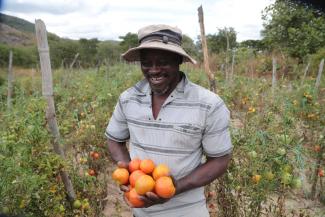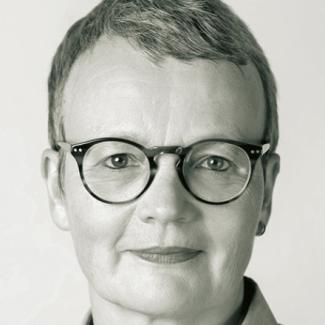Food security
“Smallholder farms must benefit from innovations”

The UN’s second Sustainable Development Goal (SDG2) is to end hunger and malnutrition by 2030. Some 10 % of humanity are currently suffering hunger. While there is enough food in principle, it is not distributed equitably. Is SDG2 achievable at all?
Unfortunately, it will probably not be achieved, as the UN secretary-general’s recent report on SDG progress has noted. Indeed, the situation is set getting worse. In 2020, 161 million more people were affected by hunger than in 2019. Some 2.4 billion lacked food security. The conclusion of the UN document is that a global food crisis is likely. We’ll have to do much more than in the past to achieve SDG2 or at least make some progress towards doing so by 2030.
What needs to happen?
There are no simple solutions, but it is obvious that we must focus more on smallholders and family farms. They account for about 84 % of agricultural businesses and produce about 35 % of all food around the world. On the other hand, diets must change. Meat consumption, for example, must be reduced.
The mission of GFAR is to increase global food supply. What do you focus on for that purpose?
GFAR is a network of networks. We cooperate with hundreds of agencies and organisations interested in the transformation of the agri-food system, including farmers associations, research centres, civil-society organisations and the private sector. We help them to network, get heard and become more involved in global agricultural research. GFAR depends on members’ initiatives and supports their priorities. On that basis, we organise joint projects, which we call “collective actions”.
Please give examples.
One collective action of ours focuses on forgotten foods – traditional crops in which there is no investment. Thousands of these plants have been cultivated in history, and they have considerable advantages, such as high nutrient content and excellent adaptation to local eco-systems (see Rabson Kondowe on www.dandc.eu). Our members have adopted a global manifesto, demanding more investment in further cultivation of these landraces on smallholder farms. That is not what big agro corporations want. They focus on only a few plants such as maize, wheat and rice (in regard to maize cultivation in Zambia, see Derrick Silimina on www.dandc.eu). Another important issue is digitalisation. Its potential with regard to payment systems, marketing or weather reports is huge. However, a survey we did showed that industrial-scale farms benefit most. To change matters, we have launched another collective action. It is designed to provide smallholders with better access to regional markets and supply chains. If we manage to improve their business prospects, that will hopefully help to reduce climate-harming emissions as well. At this point, agriculture contributes at least 31 % to global greenhouse-gas emissions, and the share is growing.
Unhealthy and environment-unfriendly diets, especially in high income countries, are among the drivers. They include too much meat, sugar and heavily processed goods. Is this pattern spreading?
Habits may slowly be changing in the global north, where this kind of diet is currently not becoming more prevalent. However, things are different in large emerging economies like China or India with a huge share of the world population. The meat sector is forecast to increase there in coming years. One implication is that the demand for animal feed will increase too. Accordingly, experts expect the agriculture’s share in global climate emissions to increase by six percent in the next 10 years. Once more, we see things deteriorating instead of improving.
What must we do to change course?
It would make sense to eat less meat. Indeed, it would be possible to cut carbon emissions by 29 % internationally by 2050 with every person on earth getting a healthy diet including large portions of fruits and vegetables.
Doesn’t it seem cynical to people in developing countries and emerging markets when they get such advice from high-income countries?
The global north is not in a position to tell the rest of the world what to consume. But it should try to be part of the solution, not part of the problem. The point, moreover, is not to forbid something, but to focus on health. The good news is that the more sustainable solutions are not only healthier, but also contribute to reducing poverty and hunger. These are the solutions we need to promote and invest in. In particular, it is essential to enable smallholders to produce highly nutrient food at regional levels. For that to happen, they must benefit from innovations.
Research is a driver of innovation. Do research institutes in the global south get the attention they deserve?
Our members say that they do not. There is a big global consortium, the Consultive Group on International Agricultural Research (CGIAR). It is a network of 15 multilateral institutions which are doing excellent work. In our experience, however, they tend to bypass partners in the global south and do not necessarily serve their interests. We want to see more involvement of our members and want partnership principles to become the global norm. One implication would be that there would be no more research about small scale producers from the global south without small scale producers from the global south.
How would that be feasible?
Smallholders always participate in our collective actions. I just mentioned the one regarding forgotten foods. In this context, we created a global manifesto for better utilisation of neglected crops. Now, we will implement it at regional levels, for example in cooperation with the Asian Farmers Association (AFA). Smallholder farmers are assuming roles of leadership, and we insist that other partners, such as academic researchers, corporations and civil-society organisations accept their leadership. We would like to see big business and multilateral agricultural research do so too. It is indispensable – the only approach that’ll allow us to really see and take into account the needs and ideas of smallholders. Solutions typically result from different parties interacting.
And you can help to spread good ideas?
If we see that something would make sense in other countries or contexts, we contribute to scaling that up in collective actions. What really matters, in our eyes, is not simply that something is new, but that it helps our members achieve the SDGs. In this sense, a technology invented somewhere in a lab is not necessarily an innovation, because innovation requires social concepts and processes. According to Harald Welzer, a German sociologist, essential progress in the course of civilisation was always brought about via improved interactions and institutions, and technology was only useful when people knew how best to exploit it. At GFAR, we agree. We are not interested in innovation for its own sake, but as an engine of progress. To emphasise that innovation must be related to values and fair, we plan to add an “I” to our name and become GFAIR.
What vision guides your work?
The SDGs, and – apart from SDG2, which we just discussed – in particular SDG17, international partnerships and cooperation for achieving all SDGs. The need for cooperation cannot be over-estimated, and we are currently seeing just how destructive narrow-minded nationalism and, even worse, warfare are on the northern shore of the Black Sea (see Jane Escher on www.dandc.eu). Anyone who is interested in cooperating with partners in the global south is welcome to get in touch with us. An email will do, we are an open forum.
Hildegard Lingnau is the executive secretary of the Global Forum on Agricultural Research and Innovation (GFAR), which is hosted by the Rome-based FAO (Food and Agriculture Organization of the UN) and funded by the EU.
hildegard.lingnau@fao.org
















